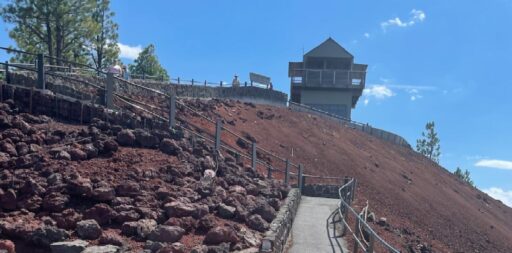
Here in the Northwest, reliable sunny summer weather typically lasts for only a few weeks. Summer can feel like a crack in time between seasons. So many of us try to wring out every little drop of out-of-door essence, condense it, and bring it home as a hedge against winter (or other unforeseen quarantines).
After our family’s mountain cabin burned down in the conflagration of 2020, after hanging out for a couple of years in pandemic isolation, my long-time husband and I decided earlier this summer that it was a good time to drive down memory lane. So we headed out, bikes in tow, to visit outposts from our early lives, when we were in our early twenties and worked for the forest service on recreation and fire crews, usually in remote locations. It felt like peeking back through a crack in time. Fifty years of time.
Our trip began with the lookout tower where we resided and kept fire watch in our early twenties, George was designated main lookout, but he was also a fire fighter. When there was a lightning bust, he’d put on his hardhat and drive a fire tanker down the hill to try to find spot fires. Then it was my turn in the tower to track the lightning hits, using binoculars to detect an orange glow, trusting an amazing device called an azimuth finder to align it with his headlights. This all had to happen while standing on a glass stool, careful not to touch metal so as not to get fried by lightning.In other words, boredom bookended with occasional hits of adrenaline.
We lived in our workspace, so we spent 24 hours a day in the same room for six months. Edward Abbey, an acclaimed environmental writer who lived and wrote in a lookout tower for three years, said that the best test of a marriage was to assign a husband and wife a job on a lookout. According to him, “Couples who survived this were destined for a long marriage, and they deserve it.” In my humble experience, it also helps if you’re young or in that “merge” stage of love that makes small spaces cozy and desirable. Lots of things have changed in our marriage during that gap of time, including our relationship with personal space, but we seem to still be living examples of Abbey’s contention.
One lookout where we lived was at the top of a steep road that wound its way up a cinder cone. The entire range of the central Oregon Cascades was our wallpaper. At night the stars and flirtatious visits by the Northern Lights were our entertainment. The tower stood out as a sentinel on the caldera, and it was also the first structure of an area that is now a national monument. So our little cabin on stilts served as an interface between the wild world and humans. We were only one flight up some stairs, so during the day the same refrain drifted through our windows: the sound of winded tourists would gasp for breath while they read the altitude sign. At high volume. And the altitude never once changed in all that time.
Most of the time we laughed at life there on the crack between humans and the wildness of nature. We hung out, staring out over the land for a blue haze, binoculars at the ready. While one or the other of us did that responsible thing, the other read or played an instrument. I planned to learn to play the banjo and never progressed past “poorly.” But we worked up a fake-bluegrass version of Smokey the Bear to torture the visitors at the end of the season. We got back at those altitude readers. I marvel now at our ingenuity and ability to entertain ourselves.
We were the last people to live in this particular tower, which is now staffed only during the day. It was a bit of a shock during our first stop on this summer’s nostalgia tour, then, when were boarded on a shuttle bus stuffed with other tourists that disgorged passengers about every half hour at the top of the caldera. I gasped my way to the top of the crater, stopping to read the altitude sign. Out loud. Once there, it almost seemed as if we were able to enter a crack in changeless time because it was all so familiar. Except the number of people swarming the caldera. I was taken aback by how rugged the living was, with a far steeper hike than I remembered, especially round trip down the little switchbacks to the only bathroom, a pit toilet.
We continued our trip to a couple of once-isolated resorts, now full of people, even though the pristine areas remain protected and once again seemed much the same, and there was an odd sense of comfort consistency in nature. We biked through stunning meadows and looped a whole lake, grateful for new bike baths. Another day we pedaled through the remains of whole towns that burned down and are now being replaced with manufactured villages, stripped of gardens and trees. Blackened ghost trees hovered dark and tall over new growth of grasses and ferns along the creeks, witnesses to the cracks in the world created by wildfire.
Ever since that trip, I notice that little cracks of wonder are everywhere, in so many places: old times and now times, honeymooners and silver anniversary celebraters, wild spaces and civilized ones, children and grandparents, night and day, destruction, damage, and renewal, summer and fall, There’s a magic in this simple but profound peek between worlds. A sense of being held by all of it, despite occasional evidence to the contrary.
May you find yourself held when the cracks in your world don’t seem kind.
Long View
Over fifty years ago
we went to sleep every night
in a glass house tied on top of poles
perched on a lava cone.
Our enemy was a flash of lightning,
a pewter puff in the distance
a glimmer in the dark
a smudge in a valley.
Our tools were a radio,
a behemoth metal fire finder
and a platoon ready to pounce.
We woke up embraced by mountains,
watched the snow dissolve until it was gone,
went to bed to among stars and sometimes
the green petticoat of northern lights flounced our way.
Our fears then were lightning busts,
renegade campfires
and the thought that
we might end up living ordinary lives.
First one and then the other of us
was the on-duty watcher
while the other one was left
to dream and scheme.
And right there on the caldera we began
to gradually glimpse our future
circled by an entire range of mountains,
and all the time in the world.
And when autumn came and socked us in
we surrendered, unready as we were, and
began to grope our way
into what was next.
—SgB
August, 2022

